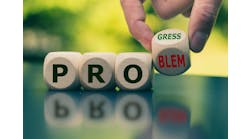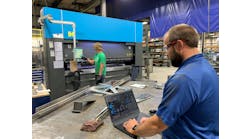Hunter Vegas, Avid Solutions, Inc.
Over time, I had a couple of boys of my own, and as they started through school, I found that they weren't enjoying science nearly as much as I did. Upon questioning them, I found that the teachers were simply teaching out of the book. There were no demonstrations, and in some cases, it was apparent that the teacher didn't fully understand the material he or she was teaching.
From that point on, I attended the "open house" each year, met the science teacher and offered to do a presentation or two a year. I would ask about the curriculum, and then create a "fun" demonstration that highlighted the subjects that the kids had been learning.
I teach solids/liquids/gases to kindergarteners using Technicolor volcanoes, dry ice tricks and Mickey Mouse the water molecule. I use prisms, incinerating light bulbs and demonstrations to explain heat and light to third graders, and show them how TVs work. I use gyroscopes, ride a bicycle in class, use spare tires to crush cans, and fire rocks with a trebuchet to demonstrate inertia and momentum.
The fourth and fifth graders get to see and interact with a 250,000-volt Tesla coil and a 400,000-volt Van De Graff generator. (Kids talk about this one for weeks.)
To sixth graders I give challenges such as building towers with only 8 x11 sheets of paper and books placed at least 6 in. apart.
My personal favorite is my talk on "Chemistry (from Alchemy through the Present Day)." The presentation is one fascinating chemistry trick after another for an hour. Things magically change color, water burns, multicolor flames burst from nowhere, etc., etc. I spend an hour on the presentation and at least a half-hour explaining how it all worked.
I love to give career-night presentations, and explicitly go to them with the intent to make engineering look the absolute best. I bring radio-controlled airplanes, do chemistry magic tricks, and basically explain how everything in the room and everything around the audience involves engineering. My whole purpose is to market my profession and make all the other options look dull by comparison.
Recently, I donated money to help replace the tools of a high school First Robotics team down in Texas, who had their tools stolen a couple of weeks before the six-week "build" period. They invited me to the state championships, and I joined in the fray, helping them keep their robot running through the tournament. They ultimately got to the semis (a vast improvement from their last place finish last year!), and I had a really good time patching together the robot and joking with the kids.
My latest project is co-authoring a book with Greg McMillan targeted at newcomers to the automation profession.
I guess my point is that, like everything else, science and engineering need to be marketed, and the earlier we start the better. Do science presentations; give engineering talks to scouts; but most important, make the presentations fun! The more flash, splash and wow, the better. Reading about electrolysis of water is dull; actually rigging a system that splits water into hydrogen and oxygen and then lighting it off in front of the class is cool!




